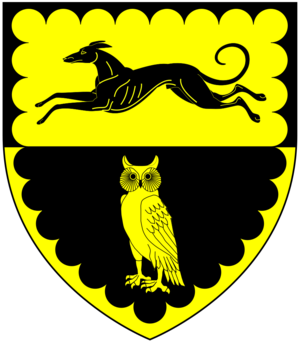John Ford (dramatist) facts for kids
John Ford (1586 – c. 1639) was an English playwright and poet. He lived during the Jacobean and Caroline eras in England. Ford was born in Ilsington, Devon.
His plays often explored the struggle between strong feelings and what people believed was right. Even though he is mostly remembered for his plays, he also wrote many poems. These poems were usually about love and good behavior.
Contents
Early Life and Family
John Ford was baptized on April 17, 1586. This took place at Ilsington Church in Devon. He was the second son of Thomas Ford and Elizabeth Popham. His mother's family, the Pophams, were from Somerset.
The Ford family had lived in Bagtor, a part of Ilsington, for many years. John Ford's great-grandfather, John Ford, bought the Bagtor estate. This estate then became the main home for the male heirs of the Ford family. Today, the old Elizabethan house of the Fords at Bagtor is still standing.
Studying and Early Writings
Ford left his home to study in London. The exact details of his studies are not fully clear. A John Ford from Devon joined Exeter College, Oxford, in 1601. However, the playwright was not yet 16 at that time.
He later joined the Middle Temple. This was a respected law school, but it was also a place where many writers and dramatists gathered. It is not known if Ford actually studied law there. He might have just been a gentleman boarder, which was common then.
Ford did not publish his first works until 1606. Around that time, he had some money problems. He wrote Fame's Memorial, a long poem about a recently deceased leader. He also wrote Honour Triumphant, a prose pamphlet. This pamphlet was connected to special events planned for a visit by King Christian IV of Denmark. It is not known if these writings earned him much money. However, by 1608, he had enough money to return to the Middle Temple.
Before becoming a playwright, Ford wrote other literary works. These included a long religious poem called Christ's Bloody Sweat (1613). He also wrote two essays published as pamphlets: The Golden Mean (1613) and A Line of Life (1620).
Becoming a Playwright
After 1620, John Ford began actively writing plays. At first, he worked with more experienced playwrights. These included Thomas Dekker, John Webster, and William Rowley. By the late 1620s, he started writing plays on his own.
Ford became a well-known playwright during the rule of King Charles I. His plays often explored the struggles between a person's strong feelings and their conscience. They also looked at how these feelings clashed with society's rules and morals. Ford was very interested in unusual human psychology. This interest is clearly shown in his plays. His works often show the influence of The Anatomy of Melancholy by Robert Burton.
Not much is known about Ford's personal life. However, one old reference suggests he might have had a personal interest in melancholy. A book from 1656 says:
-
- Deep in a dump alone John Ford was gat,
- With folded arms and melancholy hat.
Ford's Plays
Ford started his career in drama by helping to write plays with other, more famous writers. This was a common way for playwrights to begin at that time. Six of these plays still exist today:
- The Laws of Candy (1620; printed 1647), with Philip Massinger.
- The Witch of Edmonton (1621; printed 1658), with Thomas Dekker and William Rowley.
- The Welsh Ambassador (1623; printed 1920), with Dekker.
- The Spanish Gypsy (licensed 1623; printed 1653), with Dekker, Thomas Middleton, and Rowley.
- The Sun's Darling (licensed 1624; revised 1638–39; printed 1656), with Dekker.
- The Fair Maid of the Inn (1626; printed 1647), with Massinger, John Webster, and John Fletcher.
For a long time, people debated which parts of these plays were written by each author. However, in 2017, a book called The Collected Works of John Ford was published. This book provided clear evidence. It showed exactly what each author contributed to these six plays.
After 1626, Ford began writing plays by himself. Eight of his solo plays have survived:
- The Queen (1627; printed 1653)
- The Lover's Melancholy (licensed 1628; printed 1629)
- The Broken Heart (1629; printed 1633)
- Love's Sacrifice (1632; printed 1633)
- Perkin Warbeck (1633; printed 1634)
- The Fancies Chaste and Noble (1636; printed 1638)
- The Lady's Trial (licensed 1638; printed 1639)
Many of Ford's plays have been lost over time. This is common for playwrights from before the Restoration period. Some lost plays by Ford include The Royal Combat and Beauty in a Trance. He also collaborated on other lost plays with Dekker, such as The London Merchant and The Fairy Knight.
Poetry
Besides the poems mentioned earlier, several other poems by John Ford have survived. In the 1920s, a composer named John Gough set Ford's poem "Beauty's Beauty" to music.
See also
 In Spanish: John Ford (dramaturgo) para niños
In Spanish: John Ford (dramaturgo) para niños
 | Mary Eliza Mahoney |
 | Susie King Taylor |
 | Ida Gray |
 | Eliza Ann Grier |


